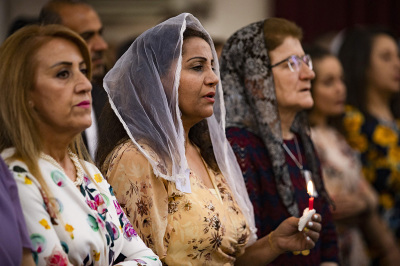The Syriacs of Northeast Syria: The last exodus and new beginning

Eleven years ago, I had to leave Hasaka, Syria, my hometown. I came from a large family of mixed Syriac and Greek Orthodox, consisting of five uncles, three aunts, and 25 cousins. Between 2012 and 2015, all of them, like many other Christians from Northeast Syria, were forced to leave the city. I was the first to depart because I actively participated in the Syrian uprising of 2011. At the age of 19, I was arrested, and upon my release, the fear of repeating the harsh experience of imprisonment made it impossible for me to continue living in Syria.
Although the rest of my family had no involvement in politics, they too had to leave. This was the fate of tens of thousands of Syriac and other Christian families in Northeast Syria.
The Syriacs played a crucial role in the establishment of the relatively new civilian cities in Northeast Syria. They transformed these areas, which were once desert lands for the Arabian Bedouins, into thriving urban centers. The Syriacs fled the Saifo Genocides that targeted our community in what is now known as northern Turkey. This genocide occurred in 1915, which, although not too long ago, still shapes the identity of the Syriacs in my community. We continue to identify ourselves with the names of the cities we came from in northern Turkey, such as Mirdaliyeh (from Mardin) or Askhinyeh (from Azekh) — even the younger generation that was born and raised in Syria remains connected to our roots in today’s northern Turkey.
History will remember 2011 as the year when the Syriac community in the region witnessed their last exodus as the numbers of Syriac have dramatically dwindled, with tens of thousands of families immigrating to Europe. The neighborhoods of the Syriacs in northeast Syrian cities were emptied of their indigenous population, and the cities saw a significant transfer of wealth from the Syriacs to the Kurds and Arabs.
Considering the current situation in the region, it is fair to say that the presence of the Syriacs, who played a major role in founding urban life in Northeast Syria, has come to an end.
This pattern of mass migration applies to most Christian communities in Syria. However, the exodus of the Syriacs was particularly significant due to their substantial impact on trade, education, and industry in Northeast Syria.
Although it is unlikely that the Syriac community will return to Northeast Syria or flourish again in the region, there is still some hope to preserve the Syriac culture. The majority of Syriacs who emigrated from Syria after 2012 ended up in the same European cities where an older Syriac immigrant community had settled since the days of the Syafo Genocide in 1915. This older Syriac community, along with the second and third generations of Syriac immigrants, continues to preserve the Syriac language and culture. Moreover, they have been able to establish political parties and cultural groups aimed at keeping the Syriac culture alive. For example, some members of my family who never spoke our indigenous language (Syriac) in Syria, started learning it for the first time in Sweden!
As a person who values public work and considers my political beliefs an important part of my identity, I regret that my community is not politically engaged and lacks a significant interest in advocating for its political and cultural rights. When I first learned about the Philos Project, I was amazed to find an organization that not only focuses on providing humanitarian assistance to Christians in the Middle East or helping them obtain visas to leave the region but also offers them a platform to discover their political rights and explore tools that can help them make an impact in their respective regions.
At the Philos Project, we are doing what we can to empower the indigenous Christian communities to create an impact. However, ultimately, the responsibility lies with the communities themselves, particularly their intellectual leaders. Throughout history, it was intellectuals and consistent organizing efforts that brought back the Jews to their holy lands and led to the creation of Israel, one of the most successful countries in the Middle East. The return of the Jews to Israel was mainly the result of the work of great minds rather than the power of bullets. Similarly, the Syriacs in the diaspora today have all the means to organize themselves and work towards the dream of returning to Syria; not as an inferior minority, but as contributors to a region exhausted by years of conflict, economic crises, and environmental challenges.
A community that has successfully preserved its culture, language and imparted knowledge of its roots to the younger generation is certainly capable of changing the course of history if it possesses the will to do so. And as Theodor Herzl once said, “If you will it, it is no dream.”
Hadeel Oueis is a Philos Project Senior Fellow.





















